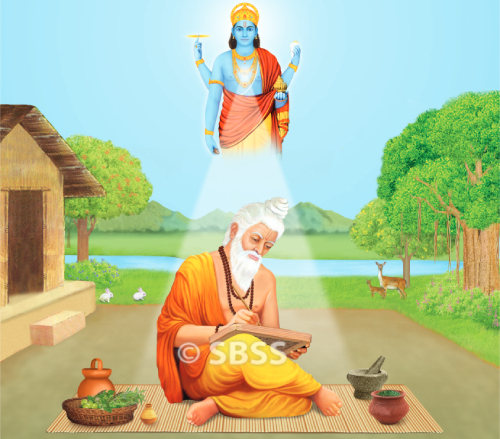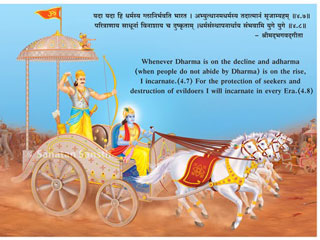Ayurveda for a healthy life ! – 30/2024 (on 16. 6.2024)
Agni (Digestive and tissue enzymes)
It is our everyday experience that to cook rice we need an important aspect and that is fire. This fire helps convert rice grains into cooked rice. Similarly, it is also essential that whatever food we take into the body through the mouth be converted into different body components. This function of conversion is performed by fires (Various digestive enzymes) in the body.
The energy or the heat element exists in the body in the form of pitta that is various enzymes. Health, vigour, strength and life itself depends on the digestive and tissue enzymes. Abnormal activity of these enzymes leads to disease while cessation of activity leads to death. A person with good digestive power that is sama-agni will have good appetite, can digest even heavy food items like shrikand, chicken, payasam etc. without having any symptoms of indigestion. After digestion of food, it is responsible for formation of various constituents of the body namely various tissue enzymes as well as doshas.
Agni that is enzymes are classified as –
1. Jatharagni or Pachakagni, which is represented by the digestive enzymes.
2. Dhatvagni that is tissue enzymes.
3. भौमाप्याग्नेयवायव्याः पञ्चोष्माणः सनाभसाः ।
पञ्चाहारगुणान्स्वान्स्वान्पार्थिवादीन्पचन्ति हि ।। – च. चि. १५.१३
Bhootagni that is elemental enzymes responsible for digestion of five basic elements viz. earth by Bhoumagni, water by Apyagni, energy by Agneyagni, air by Vayavyagni and Space by Nabhasagni. By digestion of energy element, one means transfer of Energy into utilisable form. The food is composed of all the five basic elements and individual elements in the food are digested by their corresponding bhootagni that is elemental enzymes.
Causes of affection of digestive and tissue enzymes
1. Dietetic causes : Eating in excess, fasting, incompatible diet, diet to which one is not used to; heavy, cold, dry or unclean diet; unbalanced diet etc.
2. Latrogenic causes : Administration of emetics, purgatives or any other medicine in an inappropriate manner.
3. During and following any disease.
4. Environmental factors : Abnormal seasons, hot and moist climate.
5. Suppression of natural urges.
6. Abnormal doshas.
7. Diseases of digestive tract.
8. Constitutional
The digestive power is classified as follows –
1. Vishama : Irregular due to vata predominance.
2. Teekshna : Sharp due to pitta predominance.
3. Manda : Weak due to kapha predominance.
4. Sama : Balanced due to balanced state of vata, pitta & kapha.
1. Vishamagni
It results from diet and activities increasing vata dosha, which vitiates the digestive enzymes and gives rise to vataja disorders. A person with vishama or irregular digestive power has variable digestive power. Sometimes, the digestion is good and at other times he suffers from distension, constipation, diarrhoea, heaviness of abdomen, borborygmi, colicky pain, tenesmus etc. due to indigestion. Such a person is prone to develop vata disorders. He should take predominantly unctuous food with sour and salty taste. He should take til oil enema intermittently.
2. Teekshnagni
It results from diet and activities increasing pitta dosha, which vitiates the digestive enzymes and gives rise to pittaja disorders. People with sharp digestive power digest their food very quickly. It is termed as Atyagni, when the digestive power is abnormally increased. Such a person digests even large quantities of food and later emaciates because of increased quantity of tissue enzymes and raised metabolic rate. Such an individual is prone to pitta disorders like hyperacidity, diarrhoea etc. He should take predominantly sweet, unctuous and cold food. He should take purgatives intermittently.
3. Mandagni
It results from diet and activities increasing kapha dosha and gives rise to kapha disorders. The kapha dosha vitiates the digestive enzymes. Persons with weak digestive power take a long time to digest even a small quantity of food. They commonly suffer from heaviness, cough, breathlessness, drooling of saliva, nausea and a state of exhaustion after eating food. Such persons are prone to kapha disorders. They should take food with predominantly bitter, pungent or astringent taste. They should take emetics intermittently.
4. Samagni
A person with balanced digestive power digests food easily & does not suffer from digestive disorders even with food irregularities. He can tolerate hunger & excessive food intake. Prana vayu helps ingestion of food, samana vayu controls peristaltic activity & absorption of food & apana vayu controls defaecation & expulsion of gases.
All the diseases arise as a result of less, excessive or abnormal digestive or tissue enzymes. Weak digestive power lowers the body resistance and acts as a predisposing factor to all the diseases. Even if the germs of various diseases enter the body via food and water contaminated by flies, faeces etc., the germs are killed by the acid in the stomach and the digestive juices in the gastro-intestinal tract. In case they enter and circulate in the body, they are inactivated by the active tissue enzymes.
रोगाः सर्वेऽपि मन्देऽग्नौ …। – वा. नि. १२.१
Hence a person with weak digestive power and inadequate tissue enzymes is predisposed to various diseases.
Aharaja Karanani (Dietetic factors)
Diet is important for maintenance of health. However, if one does not use his discretion regarding selection of his food
in relation to place, time, constitution etc. as given below, the same diet can give rise to disease by vitiating the doshas.
A. Diet and place : Eating hot and pungent food in continental climate (Jangala desh) or eating fatty and cold food items in maritime climate would increase pitta and kapha doshas respectively.
B. Diet and season : Eating hot and pungent food in summer or cold food in winter would increase pitta & kapha doshas respectively.
C. Quantity and Quality : Eating heavy food items in excess or too less quantity of food of light items would increase kapha and vata doshas respectively.
D. यत्तत्सात्म्यविरुद्धं तु विरुद्धं त्वनिलादिभिः ।। – च. सू. २६.२९
Eating food to which one is not habituated would also cause sudden imbalance of doshas.
E. Constitution and diet : If a person with vata constitution eats dry food, person with pitta constitution eats hot and pungent food & person with kapha constitution eats fatty and sweet food in excess, it would result in an increase of the same dosha in his body.
F. Diet and digestive power : If a person with weak digestive power eats heavy food items, it leads to formation of Aama.
G. Diet and srotorodha : Diet, which increase doshas and simultaneously damage tissues, leads to obstruction of the body channels.
H. Dietetic incompatibilities : Eating combination of milk and fish will result in increased amount of doshas in the body.
I. Eating raw food items in excess : Raw food items which are difficult to digest such as green leafy vegetables would increase vata dosha in the body.
J. Psychological incompatibility
अमनोरुचितं यच्च हृद्विरुद्धं तदुच्यते ।। – च. सू. २६.१३८
One should not eat food items which one does not like.
K. One should not eat fermented and putrefied food or food which is not freshly prepared.
L. Time : Eating food at irregular hours or eating food when not hungry makes a person prone to disease.
Our ancient masters have studied elaborately the qualities of each and every food preparation and their effects on the tissues of healthy as well as diseased individuals of various constitutions.
Hence we find references of dietary factors as etiological factors which trigger off, subdue as well as aggravate many disease processes.
Hence, in almost all diseases Ayurveda advises the avoidance of certain food items, which have a tendency to aggravate the disease and consumption of certain food items that have a beneficial effect on the recovery from the disease.


 Detergent found in ice-creams, phosphoric acid in soft drinks !
Detergent found in ice-creams, phosphoric acid in soft drinks ! Radiant Thoughts of Sachchidananda Parabrahman (Dr) Jayant Athavale
Radiant Thoughts of Sachchidananda Parabrahman (Dr) Jayant Athavale Law banning Conversion of Religion is against Individual Freedom : Babbles Former Judge S Muralidhar
Law banning Conversion of Religion is against Individual Freedom : Babbles Former Judge S Muralidhar Editorial : Khalistan, Balochistan and Pakistan
Editorial : Khalistan, Balochistan and Pakistan After India becomes a ‘Hindu Rashtra’, Russia will embrace Hinduism and spread it globally : Nostradamus’ Prophecy
After India becomes a ‘Hindu Rashtra’, Russia will embrace Hinduism and spread it globally : Nostradamus’ Prophecy ‘Halt Public Spending on Aurangzeb’s Tomb, Prioritise Maharashtra’s Heritage’ : HJS
‘Halt Public Spending on Aurangzeb’s Tomb, Prioritise Maharashtra’s Heritage’ : HJS